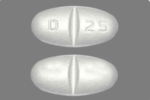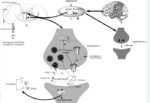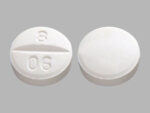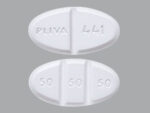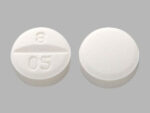Pill with imprint MP 114 is White, Round and has been identified as Trazodone Hydrochloride 100 mg. It is supplied by Sun Pharmaceutical Industries Inc.
Trazodone is used in the treatment of Depression; Sedation; Major Depressive Disorder and belongs to the drug class phenylpiperazine antidepressants. Risk cannot be ruled out during pregnancy. Trazodone 100 mg is not a controlled substance under the Controlled Substances Act (CSA).
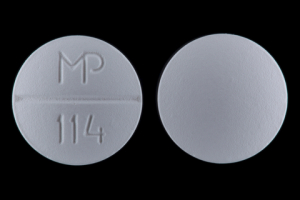
Trazodone Hydrochloride
- Imprint
- MP 114
- Strength
- 100 mg
- Color
- White
- Size
- 11.00 mm
- Shape
- Round
- Availability
- Prescription only
- Drug Class
- Phenylpiperazine antidepressants
- Pregnancy Category
- C – Risk cannot be ruled out
- CSA Schedule
- Not a controlled drug
- Labeler / Supplier
- Sun Pharmaceutical Industries Inc.
- National Drug Code (NDC)
- 53489-0511
- Inactive Ingredients
- lactose anhydrous, carnauba wax, silicon dioxide, hypromelloses, magnesium stearate, microcrystalline cellulose, polyethylene glycol, polysorbate 80, titanium dioxide
How to Take Trazodone:
- Dosage: The dosage of trazodone varies based on the condition being treated, the patient’s age, and other factors. It is typically taken once or twice a day, often after a meal or a snack to reduce the risk of stomach upset.
- For Depression: The starting dose is usually around 150 mg per day, which may be gradually increased by the doctor. The dose may range from 150 to 400 mg daily, divided into smaller doses or as a single dose at bedtime.
- For Insomnia: A lower dose is usually prescribed, often around 25 to 100 mg before bedtime.
- Administration: Trazodone should be taken as prescribed by a healthcare provider. It is important to follow the dosing instructions carefully to avoid potential side effects or complications.
- Swallowing: Take the medication whole with a glass of water. Do not crush or chew the tablets, especially if they are extended-release.
- Missed Dose: If you miss a dose, take it as soon as you remember. If it is almost time for the next dose, skip the missed dose. Do not double up on doses to make up for a missed one.
Precautions:
- Alcohol: Avoid consuming alcohol while taking trazodone, as it can increase drowsiness and the risk of side effects.
- Interactions: Inform your doctor of any other medications or supplements you are taking, as trazodone can interact with other drugs, potentially leading to serious side effects.
- Side Effects: Common side effects include drowsiness, dizziness, dry mouth, blurred vision, and constipation. Severe side effects, such as changes in heart rhythm, should be reported to a healthcare provider immediately.
Trazodone Hydrochloride Off-label Usages
Trazodone Hydrochloride is primarily approved for the treatment of major depressive disorder, but it is also widely used off-label for several other conditions due to its pharmacological effects. Here are some of the common off-label uses:
1. Insomnia:
- Primary Off-Label Use: Trazodone is frequently prescribed for insomnia, especially when it is associated with depression or anxiety. Its sedative properties make it effective for helping patients fall asleep and stay asleep.
2. Anxiety Disorders:
- Trazodone can be used to manage generalized anxiety disorder (GAD), social anxiety disorder, and other anxiety-related conditions. It helps reduce anxiety symptoms by increasing serotonin levels in the brain.
3. Chronic Pain:
- It is sometimes used as an adjunct treatment for chronic pain conditions, particularly when these are associated with sleep disturbances or depression. Trazodone may help improve sleep quality and pain perception.
4. PTSD (Post-Traumatic Stress Disorder):
- Trazodone is used off-label to help manage symptoms of PTSD, particularly insomnia and nightmares. Its calming effects can be beneficial for patients with this condition.
5. Fibromyalgia:
- Patients with fibromyalgia, a condition characterized by widespread pain, may benefit from trazodone’s sleep-improving properties, which can indirectly reduce pain perception.
6. Migraine Prophylaxis:
- In some cases, trazodone is used off-label to help prevent migraines, particularly when they are associated with sleep disorders.
7. Alcohol Withdrawal:
- Trazodone may be prescribed to help manage symptoms of alcohol withdrawal, such as anxiety, agitation, and insomnia, although this use is less common.
8. Agitation in Dementia:
- In some cases, trazodone is used to manage agitation or behavioral disturbances in patients with dementia. However, this use requires careful monitoring due to the increased risk of falls and other side effects in elderly patients.
9. Panic Disorder:
- Trazodone may be used off-label to treat panic disorder, often in combination with other medications.
10. Eating Disorders:
- While not common, trazodone may be used as part of a treatment plan for eating disorders, particularly when these are associated with depression or anxiety.
Important Considerations:
- Efficacy and Safety: The effectiveness and safety of trazodone for these off-label uses can vary, and it is typically used when first-line treatments are ineffective or unsuitable.
- Consultation: Always consult with a healthcare provider before using trazodone for any off-label purpose, as the dosage and potential side effects may differ from its use in treating depression.
How Does Trazodone Hydrochloride Work ?
Trazodone Hydrochloride is an antidepressant that works by influencing neurotransmitters in the brain, particularly serotonin. Its mechanism of action is complex and involves several processes that contribute to its therapeutic effects.
Mechanism of Action:
- Serotonin Reuptake Inhibition:
- Trazodone primarily works as a serotonin reuptake inhibitor (SRI). It prevents the reabsorption (reuptake) of serotonin, a neurotransmitter, into neurons, making more serotonin available in the brain. Increased levels of serotonin can help improve mood, reduce anxiety, and alleviate symptoms of depression.
- Serotonin Receptor Antagonism:
- Trazodone also acts as a serotonin receptor antagonist, particularly at the 5-HT2A and 5-HT2C receptors. By blocking these receptors, trazodone helps modulate the activity of serotonin, reducing anxiety and depressive symptoms. This antagonism is also thought to contribute to its sedative effects.
- Histamine and Alpha-1 Adrenergic Receptor Blockade:
- Histamine H1 Receptor Antagonism: Trazodone has strong antihistaminic properties due to its ability to block histamine H1 receptors. This action contributes to its sedative effects, making it effective for treating insomnia.
- Alpha-1 Adrenergic Receptor Antagonism: Trazodone also blocks alpha-1 adrenergic receptors, which can cause vasodilation (widening of blood vessels) and may contribute to some of the drug’s side effects, such as orthostatic hypotension (a sudden drop in blood pressure when standing up).
- Impact on Sleep:
- Due to its combined actions on serotonin, histamine, and adrenergic receptors, trazodone has a notable sedative effect. This makes it effective for improving sleep quality in patients with depression, anxiety, or insomnia.
Summary of Effects:
- Antidepressant Effects: By increasing serotonin levels and modulating serotonin receptor activity, trazodone helps alleviate symptoms of depression.
- Anxiolytic Effects: The drug’s action on serotonin receptors also contributes to its ability to reduce anxiety.
- Sedative Effects: The antihistaminic and alpha-1 adrenergic receptor blockade lead to significant sedative properties, which are beneficial in treating insomnia but can also cause drowsiness as a side effect.
Sun Pharmaceutical Industries Inc.
Sun Pharmaceutical Industries Inc. is a leading multinational pharmaceutical company based in India, with its global headquarters in Mumbai. It is one of the largest pharmaceutical companies in India and among the top global generic drug manufacturers. Founded in 1983 by Dilip Shanghvi, Sun Pharma has a strong presence in both branded and generic pharmaceuticals, as well as over-the-counter (OTC) products, with a focus on innovation and research.
Key aspects of Sun Pharmaceutical Industries Inc. include:
- Product Range: Sun Pharma offers a wide variety of products across multiple therapeutic areas, including cardiology, psychiatry, neurology, gastroenterology, dermatology, ophthalmology, and oncology. It manufactures both active pharmaceutical ingredients (APIs) and finished dosage forms.
- Global Presence: Sun Pharma operates in over 100 countries, with a particularly strong presence in markets like the US, India, Russia, Brazil, and South Africa. It has a major footprint in the US through its subsidiary, Taro Pharmaceuticals, which specializes in dermatology and topical treatments.
- Acquisitions and Expansion: Over the years, Sun Pharma has expanded through a series of strategic acquisitions. Notable acquisitions include:
- Ranbaxy Laboratories: In 2014, Sun Pharma acquired Ranbaxy Laboratories, making it the largest pharmaceutical company in India and significantly expanding its global reach.
- Taro Pharmaceuticals: Sun Pharma acquired a controlling stake in Taro, boosting its position in the US dermatology market.
- DUSA Pharmaceuticals: In 2012, it acquired DUSA to strengthen its focus on dermatology, particularly in photodynamic therapy.
- Research & Development: Sun Pharma places significant emphasis on R&D, focusing on novel drug delivery systems, specialty generics, complex formulations, and biosimilars. The company has several R&D centers around the world and continues to invest in innovation, including new chemical entities (NCEs).
- Manufacturing Capabilities: The company has over 40 manufacturing facilities across six continents. These facilities are approved by major regulatory agencies, including the US FDA, European Medicines Agency (EMA), and Japan’s PMDA. Sun Pharma’s state-of-the-art production capabilities help it cater to both developed and emerging markets.
- Specialty Products: In addition to generics, Sun Pharma has a growing portfolio of specialty pharmaceuticals, including medications for ophthalmology, dermatology, oncology, and rare diseases. The company has been expanding in these high-value markets through internal development and acquisitions.
- Biosimilars: Sun Pharma is also involved in the development of biosimilars, aiming to provide more affordable versions of biologic drugs. This is an area where the company has been investing to tap into the growing global demand for biosimilars.
- Corporate Social Responsibility (CSR): Sun Pharma is committed to CSR initiatives in areas like healthcare, education, and environmental sustainability. The company is involved in various community programs, including health camps, disease awareness, and rural development.
Sun Pharmaceutical Industries Inc. continues to grow as one of the top global pharmaceutical companies, known for its broad portfolio, global reach, and focus on specialty and complex generics.
Pain Medications, Pain Relief, and Pain Management
